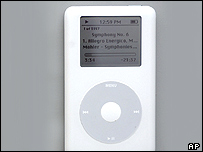The iPod is arguably the ultimate cultural icon for the 2000s. But its use is evolving, and it is now also a tool for some college students and budding DJs alike.

The iPod is becoming more and more pervasive in society
|
I would estimate that, in my New York gym, about 60% to 70% of people listen to music on their headphones using an iPod.
At Duke University in Durham, North Carolina, they have taken it one step further: giving all first year students such a device.
Some 1,600 Apple iPods were handed out free of charge. The university is paying out of its technology budget.
The students can keep the digital music players, specially engraved with the university's logo, if they can show physical ownership after one year.
But does a trend-setting gadget really belong on the college campus?
"The fact that it's pop culture doesn't mean that's the only use it can be put to," says Peter Lange, provost of Duke University.
"It's entirely plausible that it can be put to very good educational use, and what we're going to discover over the course of this year is the extent to which we can really enhance our students' education."
The iPods are being used to store classroom presentations and contact information for the dozens of departments at Duke.
It has also quickly become a popular recording device. The lectures are uploaded to a central server and can be downloaded by students as MP3 files.
Richard Lucic, associate chair of computer science, says students had their doubts at first.
But they came to understand that what used to be "dead time", such as driving their cars or being on a bus, could be used to listen to missed lectures.
Welcome to the iParty
 |
 For the first time they're actually given a chance to play music on their own
For the first time they're actually given a chance to play music on their own

|
While the iPod has not changed much in three years, its place in youth culture has.
In Manhattan two DJs who go by the name Andrew Andrew hold a weekly iParty open night.
Attendees are given seven minutes to mix and switch between two players, and can even bring their own. Customers effectively enter an iPod democracy.
As one Andrew explains, people do not usually think they will be allowed to play in a club, because most club DJs are thought of as superstars.
"For the first time they're actually given a chance to play music on their own."
The other Andrew adds: "The iPod is something where it's so saturated that everyone knows what it is. Even if they don't know how to operate it, the concept of operating one is familiar to them."
Criticism
As iPods have become smaller, their iconic status has grown, thanks to form factor, ease of use and the integration with Apple's own iTunes software.
But the proprietary nature of iTunes can also be one of the downsides, as Jeremy Kaplan of PC Magazine explains.
"The big problem seems to be the software. It's just a single product that you use a single package, a single way of getting songs onto there.
"The battery life has also been proven to be not the greatest.
"In addition, I'm not sold on that scroll wheel. I think that there are much more innovative ways of accessing your data that have come out in the past couple of years."
At the same time the phrase "iPod killer" can be found all over the internet.
It is often used to describe competing MP3 players that try to cause a distraction within the youth market.
Omnipresent

A special black edition is one of the new generation of iPods
|
The influence of the iPod can be felt throughout a whole new generation of products and accessories. That may well be reinforced in the coming months, thanks to the addition of the iPod Photo and a special edition U2 black model.
Back at Duke University, there are not many places you can go without seeing a pair of telltale white ear buds.
For Apple it is a win-win situation. Many older students are jealous. Those that did receive one also got 10 free songs as a promotion for iTunes, a point not gone unnoticed by cynics.
But the kudos factor is unquestionable on campus.
The device has become pervasive, certainly in urban America, and is arguably more than just an icon of youth culture.
It is a gadget that is omnipresent throughout society.
Click Online is broadcast on BBC News 24: Saturday at 2030, Sunday at 0430 and 1630, and on Monday at 0030. A short version is also shown on BBC Two: Saturday at 0645 and BBC One: Sunday at 0730 . Also BBC World.
Other items in this programme:
